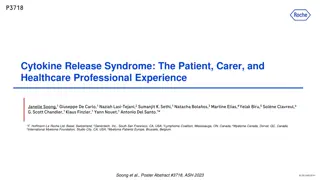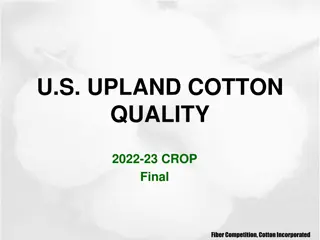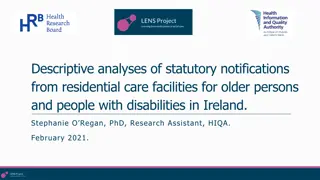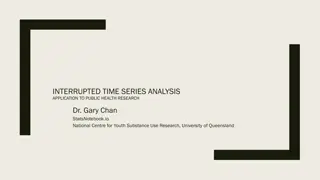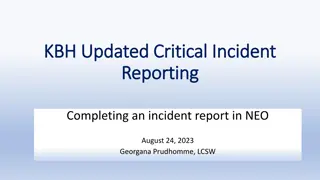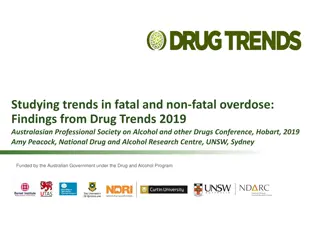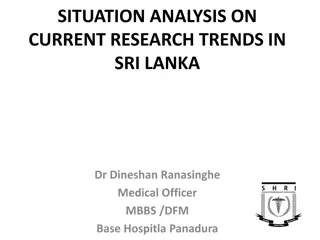Carer Research Trends in the UK: A Critical Analysis
Research conducted at De Montfort University explores the evolution of carer research paradigms in the UK since 1995, aiming to critique the relationship between research/theory and our understanding of carers. Through multi-stage reviews and analysis, the study delves into key dimensions of carer research paradigms, synthesizing knowledge and generating insights about carers and caregiving in contemporary Britain.
Download Presentation

Please find below an Image/Link to download the presentation.
The content on the website is provided AS IS for your information and personal use only. It may not be sold, licensed, or shared on other websites without obtaining consent from the author. Download presentation by click this link. If you encounter any issues during the download, it is possible that the publisher has removed the file from their server.
E N D
Presentation Transcript
WHERE TO NOW FOR CARER RESEARCH? Mary Larkin De Montfort University
OUTLINE Context Aims and methods Research paradigms - Caring in the UK: Gathering and Evaluating - Caring in the UK: Conceptualising and Theorising Generating Knowledge about Carers and Caring: Is Research Fit for Purpose? Conclusions
CONTEXT ESRC carers seminars (Oct 2012-Sept 2013) much has been written about caring in the UK over the past 30 years limited critical analysis of the evidence base critical interpretive synthesis of the nature of carer related research conducted between July and October 2013 timely: carers are growing in number but are also the subject of a range of policy initiatives across the UK start the debate and discussion about the carer evidence base!
AIMS explore how knowledge about carers has been generated and developed since 1995 synthesise the key dimensions of the carers research paradigm critique the relationship of research and/or theory to our understanding of carers and caregiving in contemporary Britain
METHODS - multi-stage review - publications selected in terms of their relevance to: review /evaluation of research or evidence relating to carers review, development or analysis of theoretical knowledge about care and carers review, development or analysis of conceptual knowledge about care and carers review or analysis of knowledge generation relating to care and carers - publications excluded: work published before 1995 and any work that was non- peer reviewed. not written in English - although UK publications were prioritised, seminal work from North America and Australia were included
RESEARCH PARADIGMS 1. Caring in the UK: Gathering and Evaluating 2. Caring in the UK: Conceptualising and Theorising
RESEARCH PARADIGM 1 - CARING IN THE UK: GATHERING AND EVALUATING - Profiling Carers - The Impact of Caring - Support for Carers
CARING IN THE UK: GATHERING AND EVALUATING - PROFILING CARERS numbers of carers who they care for age profile of carers tasks they undertake hours spent caring
CARING IN THE UK: GATHERING AND EVALUATING - THE IMPACT OF CARING carers health capacity to remain in work quality of life finances beneficial effects
CARING IN THE UK: GATHERING AND EVALUATING - SUPPORT FOR CARERS Increased policy recognition means that there is greater focus on carers rights BUT many carers are still profoundly disadvantaged by caring e.g. carers routinely overlooked and feel unsupported, powerless and marginalised only 6% of all carers in England ever receive an assessment of need service effectiveness personal budgets
RESEARCH PARADIGM 2: CARING IN THE UK: CONCEPTUALISING THEORISING AND - Conceptualising Carers - Theorising Caring
CARING IN THE UK: CONCEPTUALISING AND THEORISING - CONCEPTUALISING CARERS carer is still a contested concept - inconsistency in the usage and confused meaning analysis of conceptual models employed by services and policy makers suggest ongoing conceptual confusion e.g. - co-production - self-directed care - carers as members of the care workforce carers experiences are shaped not only by their personal responses to caring but also by a myriad of situational and structural factors
CARING IN THE UK: CONCEPTUALISING AND THEORISING - - THEORISING CARING Theoretical analyses of caring have separately and collectively extended understanding of caring as an activity: - care as a homogenous activity based on the provision of instrumental support, and ....as one person doing care to another (Ray et al. 2009 p.116)(1980s) - feminist perspectives and the gendered nature of care relational aspects of care (1990s) - nested dependencies (Kittay 1999) - the ethic of care (Tronto 1993, 1997 ) - relationality and power within caring relationships power in caring relationships is constantly (re)created and (re)negotiated through interaction and is therefore fluid, complex, and constantly shifting (Dominelli & Gollins 1997 p.412). - caring and care evolve over time (Bowlby et al. 2010 p.46) - the spatially situated nature of care (Egdell 2013)
GENERATING KNOWLEDGE ABOUT CARERS AND CARING: IS RESEARCH FIT FOR PURPOSE? The growth in research about family care has: raised the profile of carers in the public domain ensured that caring is prioritised as a significant issue for social policy and practice (Barnes 2006 p.1) underpinned the development of a highly organised and politically active carers movement extended our understanding of care and caring
RELATIONSHIP BETWEEN THE TYPE OF RESEARCH AND THE NATURE OF KNOWLEDGE there is a reinforcing and powerful link between the type of research and the nature of knowledge generated importance of exploring the dimensions of this relationship and its implications for understandings of care and caring within the two distinctive paradigms identified
GATHERING AND EVALUATING - REFLECTING ON THE EVIDENCE BASE - STRENGTHS maintained carers inside the purview of government foregrounded caring as an issue of national significance methodologically rigorous and trustworthy (relatively) easily accessed by a wide audience capacity to improve support for carers cost effectiveness dimension
GATHERING AND EVALUATING - REFLECTING ON THE EVIDENCE BASE - WEAKNESSES the evidence base is fragmented and uneven lack of sustained cross - fertilisation between research groups or funders the foci, specific methodology, nature and size of projects varies considerably weak additive capacity of studies and duplication only captures evidence about carers who are visible criticised for being conceptually narrow and under- theorised
CONCEPTUALISING AND THEORISING - REFLECTING ON THE EVIDENCE BASE - STRENGTHS adopts a wide lens of analysis in relationship to care sees care as multi-dimensional challenges narrow definitions of carer roots research in the experiences of families and service user
CONCEPTUALISING AND THEORISING - REFLECTING ON THE EVIDENCE BASE - WEAKNESSES lack of capacity to speak to an economic agenda limited foothold in applied work weak link to service and policy development in health and social care not easily absorbed into mainstream thinking about caring
CONCLUSIONS research is central to extending understanding and generating knowledge about care and caring and to improving support for carers this critical interpretive review of literature about carers, care and caring shows that two separate research paradigms with very different perspectives and approaches, dominate the discourse despite a considerable investment in carer-related research many key questions remain, at best, partially answered future research must build on the strengths of existing research , and encourage cross fertilisation and tackle its deficits
need further critical reflection on the state of the art to provide a catalyst for future debate, further analysis, and innovative research the findings of this critical interpretive review of literature about carers, care and caring can be used encourage such debate about the best way forward for carer-related research in the future central to meeting the needs of citizens, families and carers, generate new knowledge, and develop new paradigms to address one of the most challenging and complex issues of the 21stcentury
REFERENCES Barnes, M. (2006) Caring and social justice. Palgrave Macmillan, Basingstoke. Barnes, M (2012) Care in Everyday Life. An ethic of care in practice. Policy Press, Bristol Bowlby, S., McKie, L., Gregory, S. and Macpherson, I. (2010) Interdependency and care over the life course. Routledge, Abingdon Carers UK (2013) The State of Caring 2013, London: Carers UK Dominelli, L. and Gollins, T. (1997) Men, Power and Caring Relationships, The Sociological Review, 45 (3) 396-415 Egdell, V. (2013) Who cares? Managing obligation and responsibility across the changing landscapes of informal dementia care. Ageing and Society, 33, 888-907 Kittay, E. F (1999) Love's Labor: Essays on Women, Equality, and Dependency. Routledge, London Lloyd, L. (2006) Call us carers . Limitations and risks in campaigning for recognition and exclusivity. Critical Social Policy, 26 (4), 945-54 Tronto, J (1993) Moral Boundaries: a political argument for an ethic of care. Routledge, New York Tronto, J (2010) Creating Caring Institutions: Politics, Plurality and Purpose. Ethics and Social Welfare, 4 (2), 158-171

 undefined
undefined






























